Social media has changed the way we process and record the human experience
The humanities have never been more important than they are now because the 'now' is all about newness and upgrade culture, the self, selfies and so on.
The selfie culture
What if your social media posting and liking, instead of being for fun, was your job? Or rather, what if you realized that it was work and you just weren’t getting paid for it?
During the week of April 6 to 13, Twitter was taken over by an organization calling themselves International Web & FaceTwit Workers.
I Work for the Web is designed to dream what it would be like if all our Web PLAY could be our work! Join in! #iwfw http://t.co/iYtUSmNSaR
Users of the world wide web were encouraged by RockeHearst Omnipresent Bundlers to share their stories on how great it is to work for the web. The campaign was promoted on the @iworkfortheweb Twitter account.
It led to the IWFW (International Web & FaceTwit Workers) movement, rising to demand payment for that unpaid labor. #IWFW became the hashtag for complaining about all the work done on the Internet for free.
So many web workers #IWFW https://t.co/8TeATSfRvP
Some workers were all for the campaign
All this complaining from webworkers...just try to imagine your life without it...Yea u cant! #iwfw and I'm proud!
Cheers to all the unsung heroes of the web who put in hours & hours to make it a seamless, convenient place to work &/or mess around #iwfw
@SebastNoble Thank you Mr. Nobles! Would you also be kind enough to put in a good word for me with my boss? :) #iwfw
Others took this opportunity to express their dissatisfaction
I refuse to play this tweeting game any longer! NO MORE FIVE TWEETS A DAY! DOWN WITH THE INDUSTRY! #stressed #iwfw #5tweetsaday #unionize
walking away... Cant take this anymore. #workneverends #sadlife #quitting #iwfw
Who needs sunlight when you've got the glow of your laptop? #iwfw
Do u think the internet has fed our impatience & need for immediate gratification? Now buzzfeed lists are better than whole articles #iwfw
— WRIT340IWFTW (@StanziW) April 10, 2015I'm mad as hell and ain't gonna take it anymore, UNIONIZE! #IWFW @IntlWebworkers
We should replace national holidays with facebook ones. #SiblingsDay #iwfw
Nighthawks, an online watering hole for webworkers, became the site of the union solidarity movement.
I'm a lil afeared of going to Hawks after last week. My shoe shining hand is still feel so sore. What if they take out my Tweeter? #iwfw
"And then, something happens the night of April 4th at Nighthawks. Accounts vary, but it was bad. Real bad. Something like the Stonewall Riots or the Sleepy Lagoon Murder. The union busters were there. The organizers were there."
But the union workers were determined to start a social (media) revolution
Rally at Nighthawks for the start of the voting! Show bOsswebb our strength in numbers! Thumbs in the air! #iwfw voting begins in 40min
The waffling women are coming over to our side!!! #IWFW https://t.co/N7PFJGSn4x
Having more followers could mean you have more responsibility to choose what to post #IWFW
There was even a waffle maker for the web, pushing out #### daily.
A #waffle a day keeps the web boss away #iwfw #iwafflefw
########### #iwfw. Phew! All done! Thumbs are TIRED from all that #waffle making! But so worth it! Eat up! #iwfw #iwafflefw #iwfmyself #iwfb
— Waffles (@webwaffler) April 10, 2015Wait, where was I?
The entire campaign is a NetProv project. Yes, it was fictional!
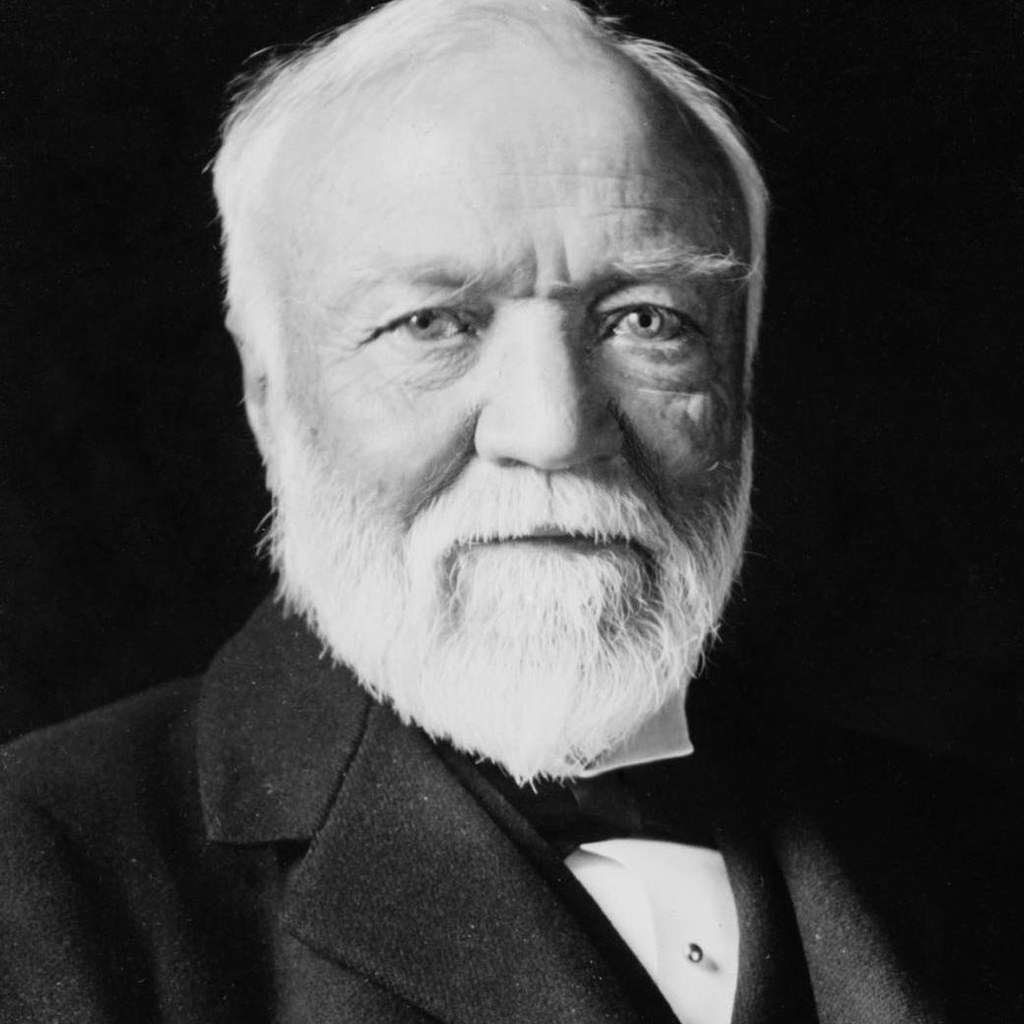
Who is NetProv?
NetProv (networked improv narrative) is an emerging art form that creates written stories that are networked, collaborative and improvised in real time. It is transmedia, collaborative and improvised (or partially so) in real time.
Co-founders, authors and improv extraordinaires Mark Marino and Rob Wittig in Hyperrhiz stated that "Netprov draws upon the fields of theatrical performance as well as game studies and electronic literature, combining aesthetic values from each: dramatic interaction, goal seeking and play, and rich signification through words and symbols."
In Dichtung-Digital, a journal of art and culture in digital media, the authors describe Networked Improv Narrative "as a genre of electronic literature predicated on establishing contexts for online synchronous and asynchronous writing."
What's the meaning of all this?
The I Work for the Web reflects on all the unpaid work we do for the Internet and the ways in which that labor is capitalized on, through advertising and other means, by the companies providing us with all those free networking opportunities.
The rest of this Buzzfeed listicle will discuss exactly how we work for the web, and what this means for us.
So, how does Facebook make money?
View this video on YouTube
BIGfish president David Gerzof Richard explains how Facebook uses your personal information to make money.
“To be clear, Facebook is not selling this information to marketers," Richard said. "What they’re doing is leveraging that information and selling a service to marketers so that they can turn around and serve us ads based on what we’re interested in and looking at."
What about Twitter?!

To encourage companies to make sure their targeted ads still look and act like regular tweets, Twitter says it will reward Promoted Tweets that resonate the most with users — those ads “are likely to appear more often.”
This is a concept known as "native advertising."
You are more likely to survive a plane crash than to click on a banner. But is native advertising really the solution? #FOMG15
Native advertising is a form of online advertising that matches the form and function of the platform on which it appears. For example, an article written by an advertiser to promote their product, but using the same form as an article written by the editorial staff.
Buzzfeed also partakes in native advertising
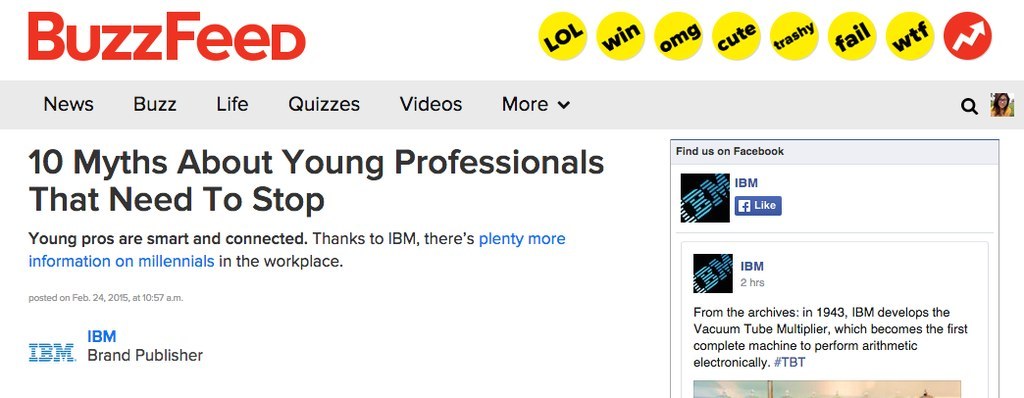
Let's take a pause and go back in time.
What's a happening?
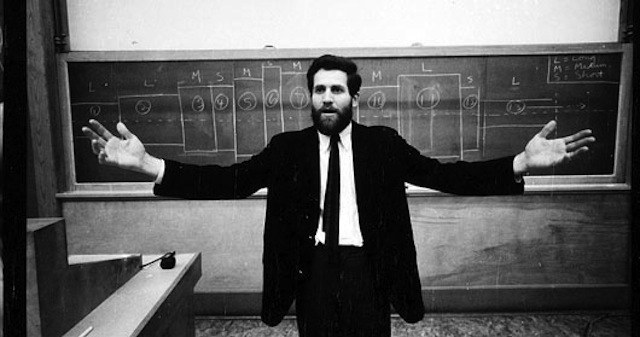
In his book Assemblage, Environments, and Happenings, published in 1966, Allan Kaprow offered a base reference on the notion of performance.
"Blurring the limits between art and life, he continues his creative enterprise by developing happenings which will act as reports of the progress of his research and his desire to escape from the systematic pigeonholing in visual arts. In 1967, he presented Fluids, followed by Transfer in 1968."
"With these two performances, Kaprow led groups of volunteers to perform construction tasks which looked pretty pointless: building a structure of ice under the sun, or moving empty barrels from their storing place. But the purpose of these happenings was to isolate the experience while engaging the attention and the energy of its participants. Kaprow drew a certain poetry from daily life, something that no material will ever be able to capture." (Frikach, 2012)
NetProv's #IWFW can be likened to the "happenings"
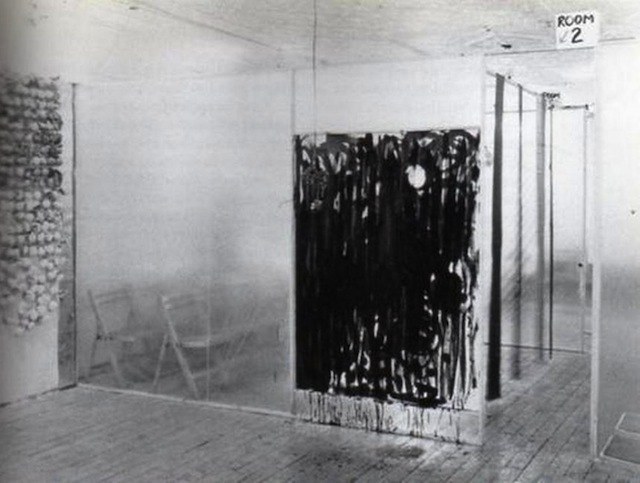
Speaking of Google Docs..
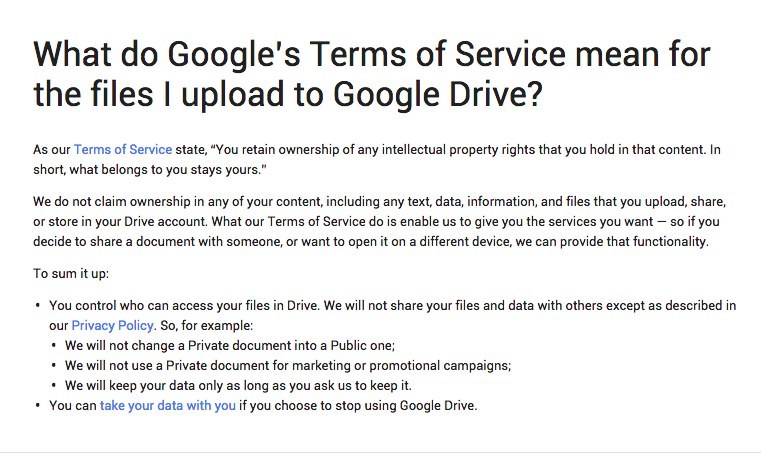
Wait, does this mean they may or may not use a Public document for marketing or promotional campaigns?
So we now know that basically everything we do on social media contributes in one way or another to native advertising.
Selfies, Instagram filters, carefully constructed status updates. Are these not improvs?
Whether you admit it or not, we are all suckers for validation on social media
Wait, does this mean that our social media use is a "happening"?
Perhaps, but here's the bigger picture.
NetProv used the very medium (social media) it was critiquing to carry out #IWFW. Their thesis is that social media corporations make money off our use of these platforms in various ways, especially through native advertising.
This comes full circle to how we use social media as a way to record the "happenings" in our reality.
So what?
i am undone #iwfw
NetProv's project #IWFW is an adaptation of a Happening in the digital age, providing discourse on social media corporations through the use of real time and real people to extend the plot. On the other hand, where social media is used to record the human experience, the corporations that own them have used this as "free labor" through native advertising. Our own use of social media is a less-functional adaptation of a Happening, seemingly pointless, but nonetheless contributes to a conversation on capitalism and free labor.


